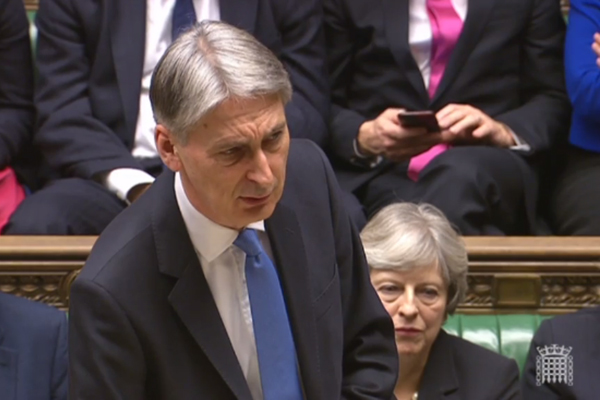You are viewing 1 of your 1 free articles

Further changes are needed to Universal Credit
Philip Hammond’s changes to the government’s flagship welfare reform do not go far enough, says Hayley Macnamara
Last month chancellor Philip Hammond delivered his second Budget as chancellor of the exchequer.
His announcement included a £1.5bn package to “address concerns” about the delivery of Universal Credit. This included scrapping the seven-day waiting period and increasing the repayment period of advances from six to 12 months.
“The design and implementation of Universal Credit has driven vulnerable people further into poverty.”
Like many welfare reforms, Universal Credit has faced months of scrutiny from campaigners, politicians and the general public.
While the purpose of the policy – to streamline benefits and prepare people for a monthly wage – is acceptable, the design and implementation of Universal Credit has driven vulnerable people further into poverty.
We’ve seen from research conducted with Cardiff Metropolitan University and from speaking with our members that the flaws in the policy have caused a negative domino effect for people already living on the poverty line.
Waiting six weeks or more for payment has left thousands in dire straits, living week by week on little or no savings. In this circumstance, survival is key – and inevitably food and necessities are prioritised over rent.
This then results in rent arrears, which have trebled in Wales compared to England under Universal Credit These factors have a significant impact on housing associations in terms of cash flow, arrears levels and resource within the organisation.
The reality is that a policy set up to prepare people for work has resulted in many not being able to afford to buy food, wash their clothes, or put the heating on, let alone travel to job interviews.
The majority of people on Universal Credit are eager to work, yet temporarily haven’t been able to due to circumstances beyond their control, such as redundancy or illness.
The chancellor’s announcement was welcome news, but is his commitment enough to mitigate the hardship people are facing?
Absolutely not.
“We are calling for the UK government to immediately pause the roll-out of Universal Credit.”
So what needs to happen now?
As the decrease in waiting time won’t come into effect until February, we are calling for the UK government to immediately pause the roll-out of Universal Credit to prevent families being left with no money for six weeks or more.
This pause should be used to review and amend the significant issues with the policy, including:
1. Waiting time
The current six-week waiting time causes significant hardship and pushes many Universal Credit recipients into poverty.
It is rare for claimants to have savings or the means of covering living expenses during this prolonged period without payment, meaning they haven’t got the money to live on.
Reducing the overall waiting time further will limit the amount of time that claimants have no income.
Offering advance payments is not a solution, and will mean tenants will be driven further into debt in the long term.
Compressing the payment processing days to less than four weeks is a more manageable time period for many people.
We also believe tenants should have an option to receive payments more frequently than monthly after the initial payment.
2. Faster payment of housing support and the option to pay directly to the landlord
We urge the government to ensure housing support is paid as soon as it is verified, thus reducing the risk of claimants falling into rent arrears.
There is also a need for tenants or landlords to be able to request for housing support to be paid directly to their landlords.
This is likely to reduce the risk of arrears and ensure landlords receive full payment of rent.
3. Improve communications between the Department of Work and Pensions, tenants and landlords
Some of the issues surrounding Universal Credit could be targeted by improving communications between the Department for Work and Pensions (DWP), tenants and landlords.
The development and introduction of a landlord portal, combined with trusted partner status, assists housing associations when verifying tenants’ rent and requesting direct payments of rent. It’ll ultimately speed up the verifying process, ensuring claimants receive their first payment on time, preventing future arrears.
While these features will support landlords and tenants, there is a risk that some areas will face a ‘postcode lottery’, and not have access to the portal for many months – meaning that many tenants will continue to experience delays and have to wait longer to receive their first Universal Credit payment.
Research conducted by Cardiff Metropolitan University and commissioned by CHC shows that an accelerated roll-out of the landlord portal is likely to relieve tenants’ anxiety when they are waiting for the verification process to be completed.
This portal could be rolled out to all social landlords quickly and easily if it were prioritised by DWP, which will result in quicker access to payments for both tenants and landlords.
With the number of Universal Credit claimants on the increase (approximately 2,722 people in Wales and 75,000 across the UK will start claiming in the run-up to Christmas), it is crucial that further amendments are made to the policy.
It’s clear the UK government is beginning to recognise the issues many on the breadline are facing as a result of welfare reform. However without further improvements, it’s likely we’ll be hearing examples of people in dire straits for much longer.
Hayley Macnamara, policy manager, Community Housing Cymru
KEY BUDGET MEASURES AT-A-GLANCE
- Investment of £44bn in housebuilding in capital funding, loans and guarantees over the next five years to boost supply of skills, resources and land
- Commitment to be building 300,000 homes a year by mid-2020s
- £1.5bn package of changes to Universal Credit announced. This includes the scrapping of the seven-day waiting period at the beginning of a claim, making a full month’s advance available within five days of a claim for those that need it and allowing claimants on housing benefit to continue claiming for two weeks
- Lift council borrowing caps in "high-demand areas"
- A £125m increase over two years in Targeted Affordability Funding for Local Housing Allowance claimants in the private sector struggling to pay their rent
- New money into Home Builders Fund
- Extra £2.7bn for Housing Infrastructure Fund
- Invest £400m in estate regeneration
- £1.1bn on unlocking strategic sites
- Stamp duty for first time buyers on properties worth up to £300k will be axed, while the first £300k on properties worth up to £500k will also be scrapped
- Three new Housing First pilots announced for West Midlands, Manchester and Liverpool
- Councils to be given the power to charge 100% council tax premium on empty properties
- Government will launch a consultation to barriers to longer tenancies in the private rented sector
- £38m for Kensington & Chelsea Council for mental health and counselling services, regeneration projects in areas surrounding Grenfell Tower and a new community space
- Invest in five new garden towns
- £125m increase in Targeted Affordability Funding for Local Housing Allowance claimants in the private sector struggling to pay rent












